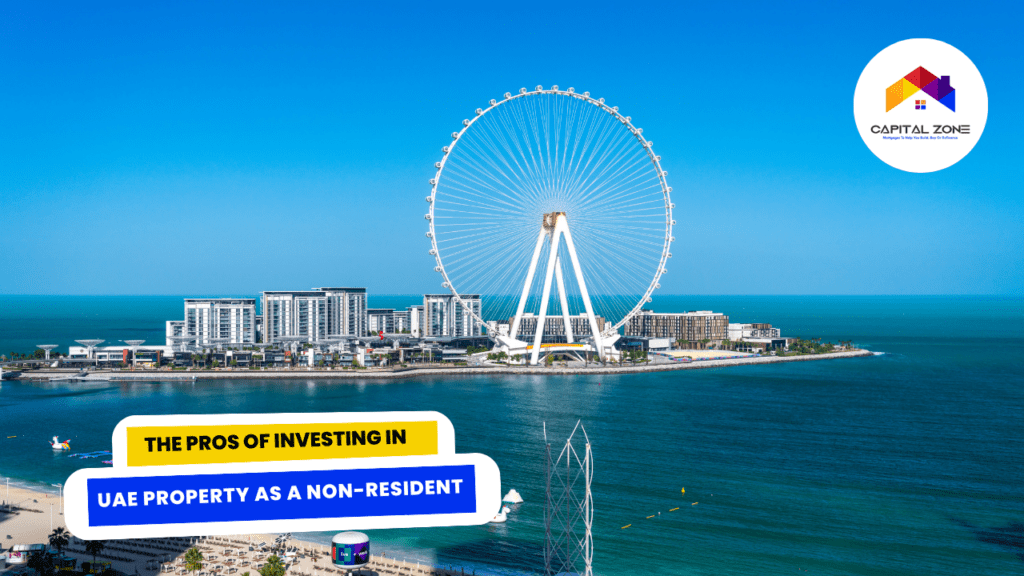Exploring the Pros of Investing in UAE Properties as a Non-Resident
Investing in real estate is an excellent way to diversify one’s investment portfolio and secure long-term financial stability. The United Arab Emirates (UAE) has emerged as a prime destination for property investments, attracting investors from around the world. This blog aims to highlight the advantages of investing in UAE properties as a non-resident. Robust Economy and Political Stability: The UAE boasts a stable and prosperous economy, driven by sectors such as finance, tourism, real estate, and trade. The country’s proactive government policies, favorable business environment, and low crime rate contribute to its political stability. These factors create a secure investment climate for non-residents. Lucrative Rental Yields: One of the key advantages of investing in UAE properties is the potential for high rental yields. Popular locations like Dubai and Abu Dhabi offer attractive rental income due to the steady influx of expatriates and tourists. With a thriving rental market, investors can generate consistent cash flow, making UAE properties an appealing choice. Tax Benefits: As a non-resident investor, you can take advantage of the UAE’s tax structure, which provides several benefits. The country has no personal income tax or capital gains tax on property investments. This tax-friendly environment allows investors to maximize their returns and retain a higher portion of their rental income or capital gains. Growing Real Estate Market: The UAE’s real estate market has experienced significant growth over the years. While there have been periods of fluctuations, the overall trajectory has been upward. The country’s ambitious development projects, such as Expo 2020 and various infrastructure initiatives, contribute to the market’s resilience and long-term potential for capital appreciation. Favorable Legal Framework: The UAE has implemented investor-friendly laws and regulations to encourage foreign investment in its real estate sector. Non-resident investors can own freehold property in designated areas, which provides full ownership rights. Additionally, the government has introduced measures to protect investors, ensuring a transparent and secure investment environment. Cultural Diversity and Quality of Life: The UAE’s diverse and cosmopolitan society makes it an attractive destination for individuals from all walks of life. As an investor, you have the opportunity to enjoy a high standard of living and access world-class amenities, including luxury shopping malls, entertainment venues, and excellent healthcare facilities. The UAE’s commitment to innovation and sustainable development further enhances its appeal. Strategic Location and Connectivity: Situated at the crossroads of Europe, Asia, and Africa, the UAE offers exceptional connectivity and accessibility. With state-of-the-art airports and world-class infrastructure, the country serves as a major hub for international business and travel. This strategic location not only facilitates investment opportunities but also ensures ease of travel and connectivity for non-resident investors. Conclusion: Investing in UAE properties as a non-resident presents numerous compelling reasons for international investors to consider this thriving market. One of the most attractive features is the high rental yields that Dubai offers, often outperforming other global markets. The demand for both short-term vacation rentals and long-term residential leases continues to drive rental income opportunities, making it a lucrative option for property owners. Additionally, the UAE’s tax-free income policy is a significant advantage for foreign investors. There are no property taxes, capital gains taxes, or inheritance taxes, which means investors can enjoy higher returns compared to many other countries where tax burdens can significantly reduce profits. This favorable tax environment contributes to the UAE’s reputation as a global hub for investment. Long-term capital appreciation is another key benefit. Over the years, Dubai’s real estate market has experienced substantial growth, driven by rapid urban development, a booming tourism sector, and continued infrastructural improvements. Properties in prime locations such as Downtown Dubai, Dubai Marina, and Palm Jumeirah, among others, have seen consistent value appreciation, making them attractive assets for long-term investors looking to capitalize on Dubai’s continued expansion. One of the main enablers for non-residents to invest in the UAE property market is the availability of mortgage for non-residents Dubai. Traditionally, international investors might have faced barriers when seeking financing abroad. However, Dubai’s banking sector has made it relatively easy for non-residents to obtain property loans. These mortgages come with competitive interest rates, often lower than those in other international markets, and flexible repayment terms. Typically, non-residents can secure financing for up to 60-70% of the property value, allowing them to leverage their investment. Related Articles:1. Partner with a Mortgage Specialist in Dubai- Achieve your goals2. Reasons your Mortgage Application is Rejected Stay tuned for more fascinating insights on UAE Mortgage trends:Website | Linkedin | Instagram | Facebook
Exploring the Pros of Investing in UAE Properties as a Non-Resident Read More »






